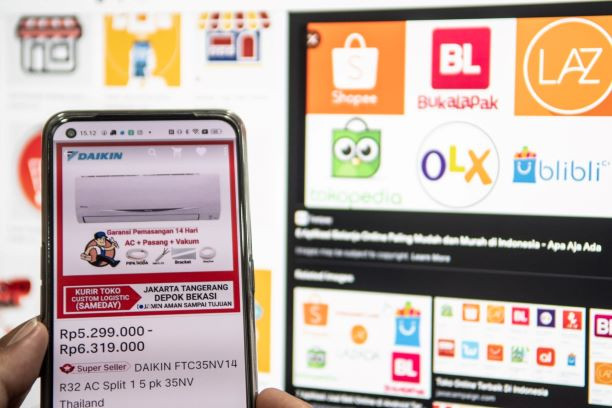Popular Reads
Top Results
Can't find what you're looking for?
View all search resultsPopular Reads
Top Results
Can't find what you're looking for?
View all search resultsFuture of e-commerce in Indonesia is conversational
In another three years, the Indonesian internet economy is expected to reach US$146 billion in value, at a growth rate of 20 percent compounded annual growth rate.
Change text size
Gift Premium Articles
to Anyone
I
ndonesia has continued to maintain steady growth momentum, with the economy growing for the fourth straight quarter, according to official data. No wonder, then, that global economists acknowledge the country as one of the best-performing emerging markets this year.
In fact, Indonesia’s digital economy was one of the prominently growing markets worldwide through the pandemic-induced recession. Innovation in the startup ecosystem coupled with dynamic shifts seen in consumer behavior have led to local businesses accelerating digital tech adoption.
Since the start of the pandemic, Indonesia saw 21 million new digital consumers and 72 percent of these new users come from non-metro areas. This is not a surprising statistic, given like most markets in the region, Indonesia leapfrogged the PC revolution to smartphones and other mobile devices. In another three years, the Indonesian internet economy is expected to reach US$146 billion in value, at a growth rate of 20 percent compounded annual growth rate – highlighting the nation’s unbridled opportunities. An ideal example of this opportunity and real change can be seen in the retail sector.
The retail business in the archipelago is changing rapidly. In a digital-first world, brick-and-mortar stores are just another part of a retailer’s omni-channel outreach strategy. Walk into any retail store today in Jakarta or Bali or Bandung, and you might begin to wonder if you know more about the products on display than the in-store associate.
Use of digital technologies have helped consumers understand product features and retail pricing strategies much better before the actual transaction, helping them to make more informed purchase decisions today. But where do they get this information from and does this lead to asymmetric information?
In today’s digital milieu, with the influx of social media, information asymmetry can adversely affect the future of the digital economy. In this scenario, what do brands need to ensure that they effectively equip their consumers with the right information to build trust and loyalty?
As consumers increasingly embrace online shopping, especially via chat, conversational commerce, enabled by conversational artificial intelligence, is seeing rapid growth in the country. Conversational AI, to put it simply, is the technology which allows users to engage with brands via conversational solutions like chatbots and get responses in return.
Conversational AI assists brands to conduct conversational commerce - enabling companies to connect with one-on-one with millions of consumers, using chatbots and AI assistants, providing a seamless purchasing experience. Consumers are offered a better and personalized experience while shopping online, with truly interactive, i.e. two-way conversations. Due to their always-on nature, chatbots proactively respond to queries and difficulties that customers typically face during the shopping journey.
Buyers can easily discover products, add to cart, complete payments and get instant service/support - all this from right within their Instagram channel, without having to navigate multiple apps/tabs/sites. This is one of the first such end-to-end conversational engagement solutions on Instagram, where consumers are offered a seamless experience.
A Facebook and BCG survey revealed that 94 percent of Indonesian customers claimed that they are most likely to buy products from sellers who are responsive to chats before making a purchase.
Conversational commerce helps brands with new customer acquisition, drive better customer-seller engagement, establish trust, and provide a seamless omni-channel brand experience through personalized experiences. The room for information asymmetry in such a scenario is greatly reduced as well since the brand is on top of the customer enablement process.
Over the last two years, Indonesia’s ecommerce growth has evolved. This transformation also coincided with changes in consumer behavior such as the adoption of digital payments and speed and convenience becoming just as important as cost savings. The pandemic has also played a key role in terms of the shift in online sales by product categories as well. For example, necessities such as grocery shopping have seen tremendous growth over the recent past.
To unlock the true potential of Indonesia’s ecommerce sector and to dial up customer delight, brands need to get their customer experience (CX) strategy right. We are already seeing that with some brands doing that, delivering intelligent micro experiences to customers using voice, video and text. For example, think of chatbots you can talk or text with, in any language, that can help you gather deep insights in a particular area - fashion trends, career advice, money management tips etc.
Utilizing these insights across different customer touchpoints, brands can know their customers well enough to deliver tailored experiences every single time to each consumer.
In summary, using AI, bots are increasingly getting better at delivering human-like experiences and this in turn will help businesses connect better and one-on-one with customers. As consumers, our shopping experience is about to become more conversational and rewarding.
***
The writer is chief operating officer of Gupshup.











